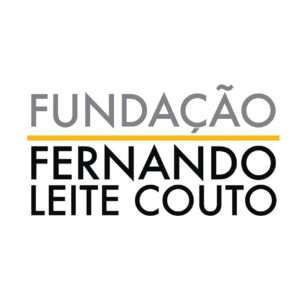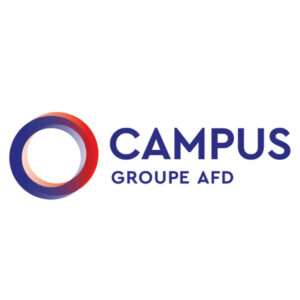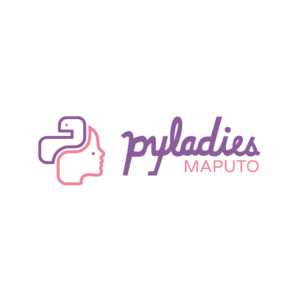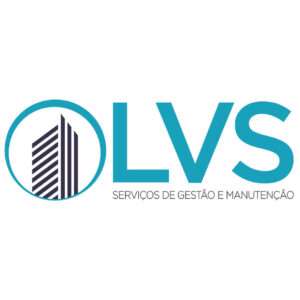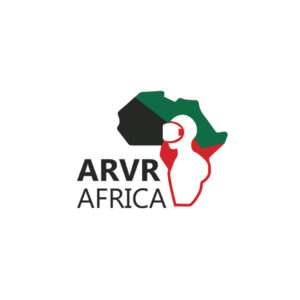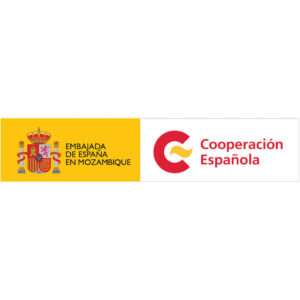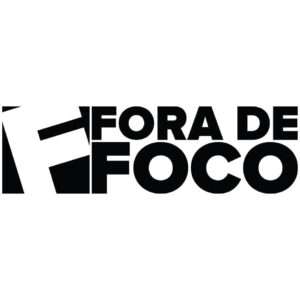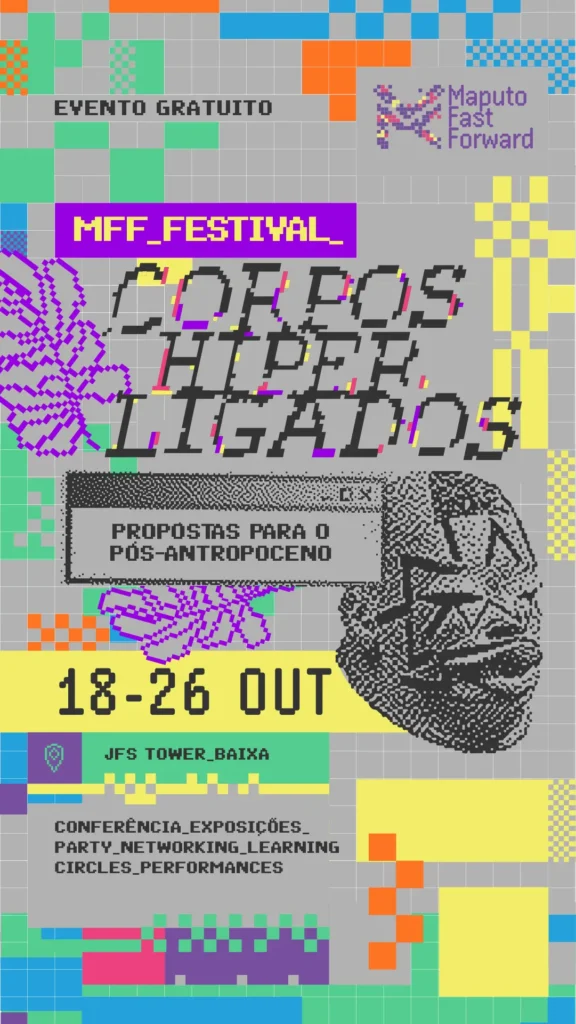‼️‼️ ATTENTION ‼️‼️
Faced with growing political and social tensions, we are forced to close this edition of the Festival, but with the unshakeable conviction that art, dialogue and culture are fundamental democratic forces.
The Maputo Fast Forward Festival expresses its solidarity with all the people of Mozambique, in defence of the right to peace, democracy, freedom of expression and security. We have always seen our festival as a beacon of creative resilience, a space where plural voices come together to imagine the future and chart paths towards just and inclusive societies.
To our community, to all the speakers, artists, collaborators, partners, volunteers and enthusiasts who joined us on this journey, and of course to our sponsors and partners who made this edition possible, our deepest gratitude.
With more than 50 speakers and artists from 20 countries.
7 exhibitions, an international conference with 5 themed panels, 2 shows/performances, 13 Learning Circles and an innovative initiatives bazaar.
All in free access
In a unique location in the city centre: on 3 floors of the JFS Corporate Tower with free parking in the building
programme
Placing Maputo-Mozambique-Africa in contemporary global discussions, this conference emerges as a space to dream, reimagine and propose other ways of relating to the planet and all those who co-inhabit it, in response to the multiple planetary crises that mark the current Age of the Anthropocene. Despite our short presence on Earth, the impact we have already left behind is profound and devastating, and we are faced with the need to devise other ways of being and being together in order to co-create ecologically healthy and socially and economically just futures.
The conference is guided by two important principles:
The first is the urgent need to relearn how to listen – to listen to the planet, to listen to each other, to our own bodies and to our past, in order to build alternative futures to the dominant mode of civilisation, which has proven to be destructive and to generate profound inequalities. The second principle is that of interconnection or hyperconnection, using as an analogy the digital concept of a hyperlink, which allows texts, images and other information to be interconnected, forming a network of connections, to reflect the deep interconnection between humans, non-humans and the planet, and the different dimensions of life, highlighting the impacts of our collective actions.
We will have five conversations, or panels, with voices from different disciplines and areas of activity, from artists, activists, ecologists, political scientists, among other voices, from different corners: Mozambique, South Africa, Eswatini, Cameroon, South Sudan, Ivory Coast, Spain/Portugal, Holland/Mexico and Brazil. The thematic panels will bring together decolonial, pan-African and feminist perspectives, seeking to reflect on the following major questions:
How can we, at the height of our anthropocentrism and ecological collapse, stop and listen to what the Earth wants to tell us? How can we, in a space of deep social and political polarisation, democratic crisis and devastating conflicts, listen to each other? How can we listen to our own bodies, often exhausted or glued to screens in the midst of hyper-digitalisation and persistent inequality? And if the ‘future is ancestral’, how can we listen to what our histories and ancestries have to teach us?
This conference is an invitation to break away from the arrogant deafness of Anthropocene absolutism. It is an invitation to listen deeply to our interconnected bodies: Body-Planet, Body-Social, Body-Human and Body-Time… Listening as a starting point for rediscovering, opening up and driving forward paths, practices and proposals for our collective futures, recognising and nurturing our interdependence, and the transition from a logic of consumerism, domination, degradation and ultra-exploitation of the Earth and violation of disposable bodies, to regenerative and healing logics that reaffirm the coexistence and plurality of Life, where life in all its forms is respected and valued.
Panel 0: How to listen to the Planet?” Proposals for the Post-Anthropocene
Friday 18.10 /4-6pm – JFS Corporate Tower
Register to take part online (in 3 languages)
“Listening has to do with the passage from the mode of consuming, of disposing of the Earth and its worlds, to becoming or being at the disposal of the Earth and its worlds.” “It is a passage from the one who possesses the Earth to the one who remembers his body as Earth, from the one who consumes the other to the one who hosts the other in order to become ourselves, from the one who thinks only of his present as real to the one who remembers the ancestral us.” Rolando Vazquez, Views of Modernity: Decolonial Aesthesis and the End of the Contemporary, 2021.
{Speakers}
{Moderator}
Panel 1: BODY-PLANET: From Extractivism to Regeneration
‼️‼️ ATTENTION ‼️‼️
CHANGE TO THE PROGRAMME:
Sunday 20.10/4-6pm – JFS Corporate Tower
Register to take part online (in 3 languages)
“We detached ourselves from the body of the Earth. We divorced it, believing that we could live on our own. On one condition: to extract, dominate and exploit everything that comes from Gaia. We have divorced ourselves from this organism that shelters us, but we are usurping it all the time.” Krenak, Ailton. Ideias para Adiar o Fim do Mundo. 2019.
The anthropocentric and eurocentric model of society that dominates our era has allowed a relationship of consumption and extractive depredation of the Earth, generating wounds in the Planet body we inhabit, which are manifested in the degradation and loss of biodiversity, climate change and increasingly frequent and intense natural disasters, bringing all living beings, including humanity to an ecological collapse. We have transformed the planet into a space that is increasingly inhospitable to the life of other species and living beings, while also making clear the fact that we seem to forget: that we are, as humanity, interdependent beings. At the same time, the impoverishment of our biodiversity is intimately linked with the impoverishment of cultural and epistemic diversity.
This panel proposes a reflection on the historical mechanisms that have led us to “detach” and disconnect from the Earth, resulting in the multiplicity of planetary challenges we face, with reflections on unbridled extractivism and its impact on the ecosystem, and the link with social and economic inequalities. It intends to unravel possibilities of political-economic and artistic paths that can nurture regenerative and healing ways of relating to Earth. Concepts such as regenerative economies, alternative energies, bioarchitecture, ecocentric arts and design will be explored. Further, the role of technology, artificial intelligence, and the importance of other systems of knowledge/epistemologies, as well as perspectives from activist movements for ecological justice, will also be elements of this interdisciplinary conversation.
{Speakers}
{Moderator}
Panel 2: SOCIAL BODY: Democracies in Reinvention
Tuesday 22.10 /4-6pm – JFS Corporate Tower
Register to take part online (in 3 languages)
“Democracy itself will have to be reinvented in the era of crises on a planetary scale.” “We need a new generation of rights that don’t depend on the nation-state.” Achille Mbembe, Noema Magazine, 2022.
In recent years, we have witnessed a significant increase in armed conflicts, genocides and extremist violence on a global scale, while at the same time observing an intensification of political polarisation and a deep crisis of democracy, fuelled in the digital age by hate bots on social networks, strengthening the antagonistic perspective of “Us” against the “Others”, which takes on racial and gender contours. Death is more prevalent for certain groups, highlighting the necropolitics and structural power inequalities that shape the configuration of the current conflicts. At the same time, due to the proliferation of wars and intensification of climate change, massive displacement and forced migration is taking place, putting the “refugee crisis” as one of the main issues of our time, raising questions about identities, belonging and borders.
This panel critically examines democracy and paths to peace in the context of global conflicts, the industry of violence, dynamics of migration, and discussions on identity, belonging, and borders. These pressing issues demand a deep reconsideration of current democratic systems both globally and particularly in Africa. The discussion explores alternative forms of democracy such as substantive and living democracy, as responses to a multitude of planetary challenges that contest the prevailing political frameworks.
The anthropocentric and eurocentric model of society that dominates our era has allowed a relationship of consumption and extractive depredation of the Earth, generating wounds in the Planet body we inhabit, which are manifested in the degradation and loss of biodiversity, climate change and increasingly frequent and intense natural disasters, bringing all living beings, including humanity to an ecological collapse. We have transformed the planet into a space that is increasingly inhospitable to the life of other species and living beings, while also making clear the fact that we seem to forget: that we are, as humanity, interdependent beings. At the same time, the impoverishment of our biodiversity is intimately linked with the impoverishment of cultural and epistemic diversity.
This panel proposes a reflection on the historical mechanisms that have led us to “detach” and disconnect from the Earth, resulting in the multiplicity of planetary challenges we face, with reflections on unbridled extractivism and its impact on the ecosystem, and the link with social and economic inequalities. It intends to unravel possibilities of political-economic and artistic paths that can nurture regenerative and healing ways of relating to Earth. Concepts such as regenerative economies, alternative energies, bioarchitecture, ecocentric arts and design will be explored. Further, the role of technology, artificial intelligence, and the importance of other systems of knowledge/epistemologies, as well as perspectives from activist movements for ecological justice, will also be elements of this interdisciplinary conversation.
{Speakers}
{Moderator}
Fidelia Chemana
Panel 3: BODY-HUMAN: Being in the digital age
Wednesday 23.10 /4-6pm – JFS Corporate Tower
Register to take part online (in 3 languages)
In the age of the Anthropocene, the disconnection with the Earth also seems to be reflected in the disconnection with our own bodies and with each other. At the same time that digital neoliberalism turns our bodies into data for consumption, human relationships are drastically transformed by digital “hyper-reality,” while labour precarity fuels a society of exhausted and time-deprived bodies. Simultaneously a precariousness in human relations seems to go hand in hand in the age of “love in the times of the algorithm”. In this panel, we explore the intersection between human bodies, health and healing and caring practices, art, technology and media in the construction of the relationship with our bodies, and human interactions increasingly dominated by digital technology.
{SPEAKERS}
{Moderator}
Panel 4:TIME BODY: Memories and Dreams
‼️‼️ ATTENTION ‼️‼️
CHANGE TO THE PROGRAMME:
Wednesday 23.10 /1.30-3.30pm – JFS Corporate Tower
Register to take part online (in 3 languages)
Imagination, art, speculative fiction, and cultural production are essential tools for envisioning alternative futures and weaving together collective identities and dreams. Grounded in an understanding of time as circular, where past, present, and future nourish each other and engage in dialogue, this panel aims to serve as a space to relearn our plural Histories, Memories, and Ancestralities, as bridges to cross to a post-Anthropocene era.
{SPEAKERS}
{Moderator}
The “Learning Circles” are spaces designed for deeper involvement and reflection on the festival’s themes, offering a more dynamic, horizontal and interactive format.
Led by a facilitator, or by a group of people who bring knowledge, practices or case studies, these circles encourage fluid dialogue and mutual exchange between participants.
They can also involve activities and support materials, in sessions up to two hours. These Learning Circles are also intended to establish a link between people or initiatives that share similar interests, causes and objectives.
{ SESSION_ 001 //Decolonial Aesthesis and the struggle fo the joy of life}
Saturday 19.10 /11am-1pm – JFS Corporate Tower – 7th floor
This session will be dedicatted to decolonial aesthesis. We will see how the emergence of the modern/colonial world with its generalized consumption of the life of others and the life of Earth, generated a system of knowledge and of aesthetics that is complicit with its violence. Here aesthetics is not confined to its definition in the arts, it referes to the way in which our experience of the world is regulated through our senses. It points to how the dominant order incorporate at the same time that it is incorporated in our own bodies. With whose tongue are we speaking? With whose eyes are we seeing? Whose dreams are we dreaming? Decolonial aesthesis search for a delinking from modern aesthetics. It denounces the perversity of how through governing our sense modern/colonial aesthetics makes us to enjoy the consumption of life. Delinking means the overcoming of modern aesthetics towards relational aesthesis, towards other forms of being with Earth and others, towards recovering the joy of life.
{ SESSION_ 002 // Immersive imaginaries}
Saturday 19.10 /4.30-6.30pm – JFS Corporate Tower – 7th floor
As part of the festival, an innovation day, entitled ‘New Narratives’, will explore storytelling through new media and XR. It will allow the public and Maputo’s digital community to participate in experiences with XR installations and exhibitions, masterclasses, games and other new media to engage with the public in an interactive and participatory way. This panel will explore and contextualise how immersive technologies in Africa and around the world are opening up a new world of broadcasting and storytelling.
{ SESSION_ 003 // Ecofeminisms}
‼️‼️ ATTENTION ‼️‼️
CHANGE TO THE PROGRAMME:
Sunday 20.10/9-11am – JFS Corporate Tower – 7th floor
Modernist thinking emphasises separation and individualism – separation from the body, emotion, wisdom, creativity, community skills, a living world and a complex understanding of place. It is anthropocentric, where other forms of life are at the disposal of humans. A new narrative of the universe is emerging, questioning these fundamental beliefs. Feminists, as well as indigenous communities, have been talking about the importance of relationality and kinship. And increasingly, the Earth is responding to us.
In this learning circle, we will explore the interconnected nature of relationships within communities, natural systems and the ethics between time and space, elements that are central to understanding ecofeminism.
WoMin is a pan-African ecofeminist alliance that works with women’s organisations, peasants and communities affected by extractive developments, supporting movement building and women’s solidarity.
{ SESSION_ 004 // Recycling!}
‼️‼️ ATTENTION ‼️‼️
CHANGE TO THE PROGRAMME:
Sunday 20.10 /11.30am-1.30pm – JFS Corporate Tower – 7th floor
Recycling is a debate about how to deal with the result of our consumption – what some call rubbish and others raw material. We’ll discuss different strategies such as recycling, upcycling, and downcycling, to inspire the creation of projects and businesses by the participants.
{ SESSION_ 005 //Innovation for socio-environmental projects }
‼️‼️ ATTENTION ‼️‼️
🚫Session cancelled 🚫
When we look at something from a distance, what seems small has no presence, it disappears. Many talk about changing everything, saving the planet, ending hunger, ending poverty… It seems too big, too epic, too far away to be real. We talk about children with their own names, not ideas. We talk about what we see, what we do, not what we dream. In a world of battles this big, at Khanimambo we bet on what seems small. Less epic, more facts, more down to earth. We don’t need heroes. We need people like you, committed to generating profound change. DAY AFTER DAY, CHILD AFTER CHILD, WORLD AFTER WORLD.
{ SESSION_ 006 // Substantive democracy}
Tuesday 22.10 /10-12am – JFS Corporate Tower – 7th floor
Africa has entered a new historical cycle. Today, the desire for democracy is once again embodied in a variety of terrestrial practices, in many territories and third places, and in various local experiences. They need to be mapped, designed, supported and, if necessary, modelled. This cannot be done without a change in analytical grids, a general decolonisation and rearmament of concepts and categories, a willingness to draw on endogenous knowledge and intellectual traditions, and a commitment to a new way of thinking.
{ SESSION_ 007 // Missing Bodies, video performance }
Wednesday 23.10 /11am- 1pm- JFS Corporate Tower – 7th floor
How does a mutilated body remain a body? Yes, the body is missing a part, but the body remains a body. How far does a body remain a body? As long as it breathes, the body remains a body. Is it still a social body? Not really. The other person’s gaze mutely says “it’s incomplete”.
Missing Bodies is a collaboration with 6 amputee participants who were victims of anti-personnel mines and consisted of the creation of several performance videos.
Participants : Helena Tevete, Celeste Munguambe, Henriques Duarte, Constantino Ernesto, Antônia Viajem and Costa Antonio
Production: Perceuse Productions Scènes
Partners: CC Connecting Cultures, ADEMO, Donakati, Ampola Audiovisual
With the support of: Swiss Arts Council Pro Helvetia
Special thanks to: Marcela Tommasi
{ SESSION_ 008 // Sob Escuta: crate digging for history }
Wednesday 23.10 /6.30-8pm – Fundação Fernando Leite Couto
Listening Session & Conversation
Atiyyah Khan (Future Nostalgia) will lead an hour-long listening session around the importance of crate digging into African music, listening and uncovering history through sound. Khalid Shamis (filmmaker, editor and DJ), will join in for a conversation.
{ SESSION_ 009 // Rooting out relationships: Rediscovering our interbeing}
‼️‼️ ATTENTION ‼️‼️
CHANGE TO THE PROGRAMME:
Wednesday 23.10 /11am-1pm – JFS Corporate Tower – 7th floor
In this workshop, we invite you to reflect on our own belonging and relationships in the economy. It is an invitation to discuss and feel what lifestyles and values align with a holistic understanding of being an interbeing. It is an invitation to open our hearts and minds for a more connected way of relating. Together, we explore how we can (re)root healthy relationships with ourselves, the economy and the ecology.
The session draws inspiration from deep ecologists like Næss and Rachel Carson, setting the base for a conversation about a deep economy. The format is largely inspired by Joana Macy’s work: The Work That Reconnects. Deep ecology is best described through poetry; we will therefore include poetic elements, and invite participants to bring a poem they find suitable.
{ SESSÃO_ 010 // Estruturas ressonantes: montagem, arquivos, som e objectos}
‼️‼️ ATTENTION ‼️‼️
CHANGE TO THE PROGRAMME:
Saturday 26.10/10am-12am – JFS Corporate Tower – 7th floor
How can we hear a building and the stories, voices and histories it contains? What kind of voice does it speak with and what kind of acoustic space can it create for today’s listening public?
Resonant Structures invites visitors to explore Radio Mozambique as a significant social, cultural and political structure in colonial and post-independent Mozambique. The exhibition is developed in conjunction with artist ngela Ferreira, whose sculptural intervention distils architectural elements from the Rádio Moçambique building located on Rua da Rádio.
Engaging with the concept of ‘the voice that remains’, Estruturas Ressonantes offers an extended listen to Rádio Moçambique, foregrounding the station as an archive and a resonant body that holds cultural, political and creative legacies.
{ SESSION_ 011 // Mind-body medicine}
‼️‼️ ATTENTION ‼️‼️
🚫Session cancelled 🚫
From war to domestic violence, from public health crises to climate catastrophes, from chronic illnesses to the vulnerability of ageing, from generational trauma to systemic racism, trauma is inevitable. In this knowledge circle, we will explore Mind-Body Medicine practices as a tool for individual and collective healing and trauma relief in times of increasing emotional and physical challenges, exacerbated by the modern model of life and social and environmental crises. Through techniques such as conscious breathing, the genogram, drawing, body movement and meditation, we will discuss how we can reconnect body and mind to promote health and well-being, not only on a personal level, but also in communities.
Mind-Body Medicine has its roots in various traditions, including indigenous practices and ancestral therapies in Africa, which have historically understood the interconnection between body, spirit and community as a vital source of healing. We will also explore the impact these practices can have in contexts of collective trauma, such as those experienced in situations of conflict, forced migration or humanitarian crises. It will be a moment of open dialogue, where everyone is invited to share knowledge, experiences and co-create strategies for well-being and healing that resonate with local and global realities.
{ SESSION_ 012 // Benga, Village of the future, MFF Research}
‼️‼️ ATTENTION ‼️‼️
CHANGE TO THE PROGRAMME:
Saturday 26.10 /1-3pm – JFS Corporate Tower – 7th floor
A round table discussion will introduce Mozambique, a new country, which gained its independence only 49 years ago, and which has been living under the geopolitical pressure of globalising cultures ever since. These ‘globalising’ cultures are increasingly proving to be unsustainable, especially because of the ecological crisis of recent times. Since the values of the West are increasingly proving dysfunctional, it has become important to look at ourselves and local (traditional) cultures, if they don’t contain solutions that can help mitigate the global crisis? The pressure of globalisation from the presence of (coal mining) multinationals means that nearby villages organically have to make decisions that perhaps we should have taken the time to question. Which local (traditional) values are important to maintain and which could be replaced by more global values. This paradoxical context between the traditional and the modern makes Aldeia de Benga a kind of ‘village of the future’ where houses made of clay have electricity, and lampposts light up streets where animals (goats, oxen, donkeys, etc.) share space with people and music, dance, cinema, the arts, sport and religion move within their own dynamics. Almost all global trends here have a local flavour. This almost surreal context could be the creative (inspirational) source of a possible solution for a city of the future. Where animals, farms, technology, the arts and so on coexist in harmony.
Proposing a solution to the ecological crises we are experiencing today.
{ SESSION_ 013 // Rewilding Mozambique: Is conservation the new frontier for development? }
‼️‼️ ATTENTION ‼️‼️
🚫Session cancelled 🚫
KAMBAKU is a natural world news platform that aims to inform, debate and analyse issues related to biodiversity conservation and sustainable development, with a focus on Mozambique, but with a comprehensive look at Africa, Lusophony and the world.
We will hold a debate and Q&A on the importance of community-based conservation and screen the film ‘The Rhino Man’ 96mn
Saturday 26.10 /7pm-8pm – JFS Corporate Tower – Ground floor
The result of the MFF Academy residency, New Kids is the second group to create a show. This year’s interdisciplinary casting brought together 10 talented young people, 5 artists and 5 technical profiles, who were guided by a team of mentors to create an innovative show:
Body of bodies:
Inspired by human evolution, from the Anthropocene concept, a useful concept to explain the environmental threats induced by humanity from Industrial evolution to the present day, ‘Corpo de Corpos’ invents other concepts thinking about new evolutions influenced by the rapid development of technology.
From this inspiration, imaginary characters emerge who develop a fictional story and narrative of two worlds, a world of human beings and hybrid beings displaced in a future time and with different urgencies. Despite conflicting values, both seek survival and balance.
Saturday 26.10 /8pm-9pm – JFS Corporate Tower – Ground floor
Incomate River was born out of the synergy between May Mbira, Mestre Mbireiro from Mozambique and a Live-Looping artist of voice and traditional instruments in an electronic context, and Guillermo de Llera Blanes, an academic, artist and multi-instrumentalist best known for being a founding member and composer of Primitive Reason from Portugal. The two leaders of the group are joined by the builder, researcher and player of traditional instruments: the master Maneto Tenfula. The project will bring to the stage improvised music based on recordings of traditional instruments from Mozambique, playing instruments – including an instrument they built themselves; the MidiMbira – and mixing the music live on loopstations and digital controllers.
New Narratives
New Narratives will explore storytelling through new media and XR. It will allow the public and Maputo’s digital community to participate in experiences with XR installations and exhibitions, masterclasses, games and other new media to engage with the public in an interactive and participatory way.
All immersive exhibitions open from 7pm on Saturday 19.10
On the 7th floor of the JFS Corporate Tower
They will be accessible all week until the festival closes on 26 October.
Mganga Wa Kitui’ explores the complex interplay between African witchcraft and religion in a contemporary setting. Set in the dynamic milieu of the Akamba tribe, now a bustling metropolitan community, the story explores the collision between modernity and ancient magic, leading to a profound journey of self-discovery and cultural rebirth.
Objectives:
- To immerse participants in a unique VR experience that highlights the richness of African culture and spirituality.
- To engage the audience in a dialogue about the intersection of modernity and ancient traditions
- To demonstrate the potential of VR in preserving and promoting cultural heritage through innovative storytelling
Ferenj is a visual dialogue between memory, reality, and the digital, in an afrosurreal dreamscape crafted from the director’s reconstructed memories questioning the meaning of home and identity as a mixed-race, Ethiopian-American growing up amidst cultural dissonance.
The viewer is guided through fragments of Empress Taytu (her parents’ Ethiopian restaurant in Cleveland, OH), to the house where she grew up and to the streets of Addis Ababa, Ethiopia by a speculative one-way conversation between the narrator and Empress Taytu – the restaurant personified as the historic Ethiopian empress.
The score consists of Ethio Jazz hits as well as an original ‘krar’ recording. The sound design is made up of found sounds, and the soundscape of Addis Ababa disrupts scenes in Cleveland and vice versa, advancing the concept of an intersectional ‘post-spatial’ home traversing crosswalks, continents and consciousness.
This story’s narrative arc is driven by the evolution of Robson’s understanding of her identity over time. After being confronted as ‘ferenj’, meaning (white) foreigner in Amharic, can Robson find a way to conquer her racial imposter syndrome and embrace both worlds in one identity?
Co directed with Meghna Singh. Screened at the 78th Venice International Film Festival and Tribeca Festival 2022.
Container makes visible the ‘invisiblized’ bodies enabling our consumer society. Confronting slavery through an ever transforming shipping container, the past becomes the present, the invisible become visible. We witness the shards of society: the ghosts of the past and living spectres of the modern world.
Benga, the village of the future
Materialise the research by recreating an environment (installation) that expresses the character, the ‘spirit’ of Benga (the research site), recreating the façades that must be exposed in order to ‘stage’ the character of the living spaces between the buildings in Benga.
Researcher Adamo Murrombe
Objects of Infinity
Exhibition Concept – Michel Onésio
This exhibition marks a new chapter in my artistic journey, where I delve beyond the visual and into the realm of the unconventional and unsettling. My work seeks to provoke and evoke emotions that challenge the familiar, offering experiences that disrupt comfort and invite introspection. In this phase, the idea of “infinity” emerges—endless possibilities born from the entropy of life, where things fall apart only to reassemble in new and unexpected ways.
Through this chaotic process, my pieces take shape, moving from disorder to a structure vision.
At the core of this exploration is my reinterpretation of classical paintings from the Renaissance and Impressionist eras. By deconstructing these historic works, I engage with their essence through abstraction, reshaping their narratives and compositions to reflect my own creative approach. This exhibition is an invitation to experience the transformation of the familiar into the abstract, where each piece speaks to the infinite potential of art and the boundless nature of creation.
Midi Mbira, Guillermo de Llera Blanes
The MidiMbira is a hyper-instrument that has been developed by musician and academic Guillermo de Llera Blanes collaboratively with Mozambican mbira maker May Mbira, during five years of fieldwork. The creation of this hybrid-acoustic/digital instrument is aimed towards researching inherent playabilities of traditional musical instruments from within the digital realm, and from there creating new avenues expression that respect traditional playabilities and identities. Therefore, as a digital controller capable that is controlling any MIDI device and interacting with audio, video, and light control software, the MidiMbira bridges ancestral forms with new futurisms.
Resonant Structures: assembling, archives, sound and objects Bhavisha Panchia, Angêla Ferreira
How can we listen to a building and the stories, voices, and histories it holds? What kind of voice does it speak with, and what kind of acoustic space can it create for today’s listening public?
Resonant Structures invites visitors to explore Radio Mozambique as a significant social, cultural, and political structure in colonial and post-independent Mozambique. The exhibition is co-developed with artist Ângela Ferreira, whose sculptural intervention distils architectural elements from Radio Mozambique’s building locate on Rua da Rádio.
Engaging with the concept of ‘the voice that remains,’ Resonant Structures offers an expanded listening to Radio Mozambique, foregrounding the station as both an archive and a resonant body that holds cultural, political, and creative legacies.
Narrativas de Cura , Karinagana wa karingana
“Narrativas de Cura: Weaving the Healing Stories of Cabo Delgado” is an interactive exhibition that explores how art and craft serve as powerful vehicles for expression, resilience, and communal healing. Featuring the work of women from eight distinct communities involved in the Kuinua project, this exhibition celebrates the rich cultural heritage of Cabo Delgado through a collection of woven straw carpets, textiles, and Capulanas. The exhibition is a sensory experience, engaging visitors through sight, sound, smell, and taste, while emphasizing the circular, communal nature of healing.
Master Class: “Património e XR; realidades do património ” by Walid Kilonzi
Limited spots available – Register now
Saturday 19.10 / 2 PM-4 PM
In addition to the VR demonstration, we are offering a masterclass titled “Heritage and XR; Heritage Realities,” which will explore the nuances of XR technology and its role in reducing over-tourism, saving eroding cultures, and preserving heritage. The masterclass will delve into the conceptual and technical aspects of XR.
Objectives:
- Provide an in-depth exploration of how XR can contribute to heritage preservation.
- Discuss the potential of XR in mitigating the negative impacts of over-tourism.
- Examine the technical aspects of creating and implementing XR solutions for cultural heritage.
MFF BAZAAR
The MFF Bazaar is a space for presenting concrete, innovative and creative proposals. Participants share a common desire to rethink innovation and break the limits of imagination towards more balanced ways of living, through design, publishing, recycling and other means.
{ Participants}
Sponsors
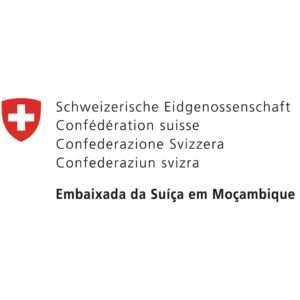
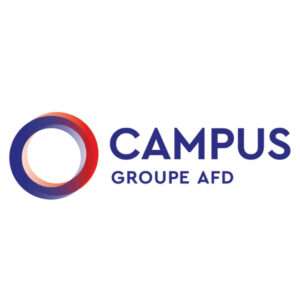
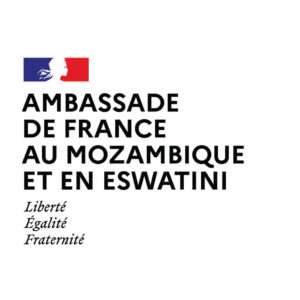
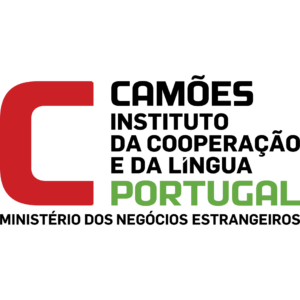

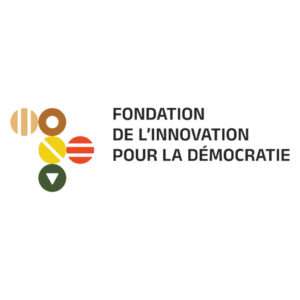
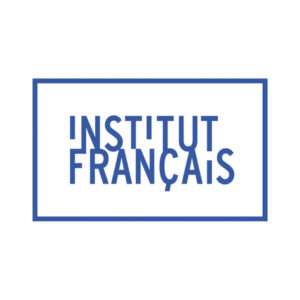
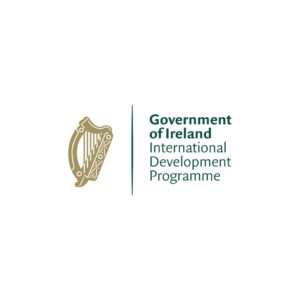
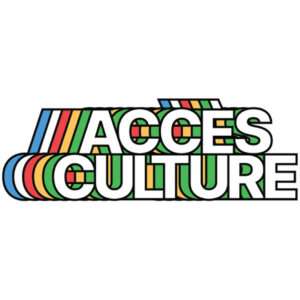
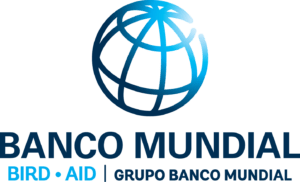

Partners


